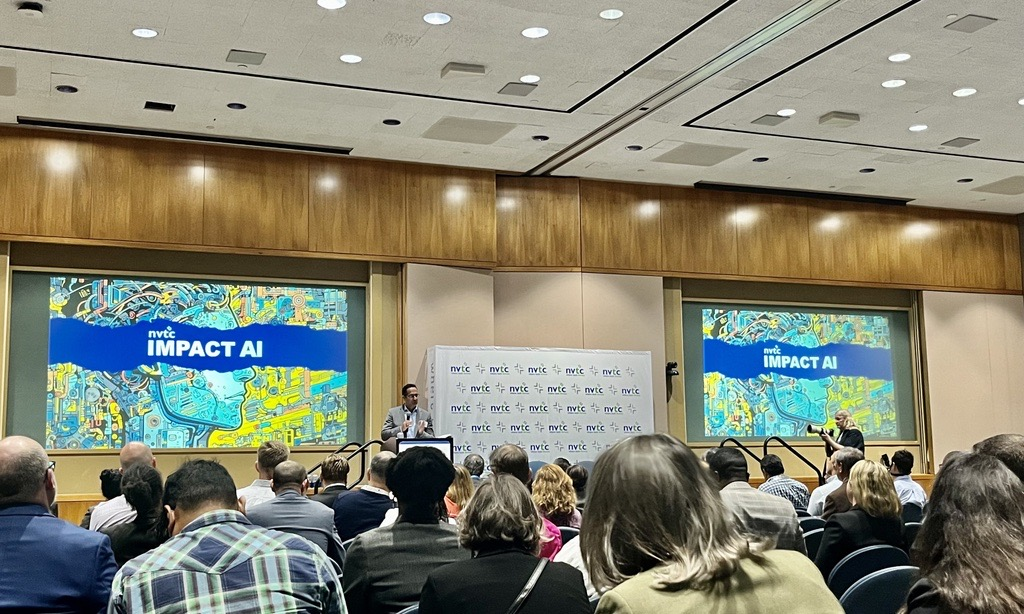Charting the Future of Responsible AI: Reflections on the NVTC Impact AI Summit
Attending the NVTC Impact AI Summit was an enlightening experience. The conference focused on the responsible use of AI, exploring both tactical and practical applications, as well as the future of AI in the workplace. It brought together thought leaders, innovators, and policymakers to discuss how artificial intelligence can be harnessed responsibly to drive innovation and efficiency across various sectors. My participation provided me with deep insights into the current state of AI and its trajectory, emphasizing the crucial role of responsible AI in shaping the future.

Here’s what I learned…
Ensuring responsible AI use is crucial for fostering trust and widespread adoption.
Dr. Matthew Johnson, Acting Chief of Responsible AI, Chief Digital and Artificial Intelligence Office (CDAO) for the U.S. Department of Defense (DoD) emphasized that giving assurances about AI responsibility, including traceability and audits, not only increases user adoption but also significantly reduces doubt and cognitive load. The DoD set a precedent as one of the first militaries in the world to adopt responsible AI principles, a move that has inspired other countries to follow suit. Their development of guidelines and a toolkit for AI, including generative AI, is a testament to the growing emphasis on responsibility in AI deployment.
Implementing AI can provide a competitive advantage.
In today’s geopolitical landscape, the race to harness AI is marked by varying regulatory approaches. The summit highlighted that the goal is not just to outdo competitors with AI but to use it responsibly and effectively, fostering client trust in new use cases and solutions. Alyssa Lefaivre Škopac, Head of Global Partnerships and Growth from the Responsible AI Institute, made a strong case that responsible AI, contrary to stifling innovation, actually fosters it. Proper AI governance aligns incentives to organizational objectives, minimizes technical debt, and maximizes budgets by prioritizing truly impactful use cases.
Fostering responsible AI through audit and traceability is essential.
The panel discussions revealed that the regulatory landscape for AI is evolving rapidly. Governments are keen to establish guidelines ahead of widespread AI adoption. Good intentions alone are insufficient; setting up guardrails is essential. Organizations that can demonstrate their AI use cases are trustworthy and responsible are more likely to gain buy-in and speed up adoption. As Shivani Desai, Space Sector Data & AI Architect from Northrop Grumman pointed out, adopting responsible AI starts with core values and requires meticulous documentation to ensure compliance and trust.
Practical Steps for AI Implementation
For companies just beginning their AI journey, the summit provided actionable steps:
- Establish responsible AI principles aligned with organizational values.
- Define AI internally and begin inventorying it.
- Assess suitability, feasibility, and advisability for each AI use case.
- Recognize that over 50% of AI systems are procured, making it vital to understand the embedded AI in existing tools.
- Utilize toolkits and resources to guide operationalization and streamline AI governance.
The Future of AI
Responsible AI should be a non-negotiable standard.
The summit made it clear that responsible AI will become a non-negotiable standard in both development and deployment. Driven by a global shift towards ethics and transparency, organizations will need to integrate AI governance into their objectives from the outset. This approach will foster trust and ensure that AI technologies are used ethically and effectively.
The regulatory landscape will continue to evolve rapidly.
Governments will play an increasingly active role in setting guidelines and guardrails for AI use. This proactive approach will lead to more predictable AI frameworks, enhancing trust in AI systems and driving broader adoption. As regulations evolve, organizations that have already implemented responsible AI practices will be better positioned to comply and thrive.
AI is a competitive necessity.
AI adoption will become a competitive necessity across all sectors. Organizations will recognize the potential of AI to drive innovation and efficiency, leading to a “race” not just in technology but in responsible and effective implementation. Those that leverage AI responsibly will gain a significant advantage in the marketplace.
The realistic and practical applications of AI have their limitations.
The summit highlighted the need for a realistic and practical approach to AI. Viewing AI as an operational tool with inherent limitations will help organizations implement it more effectively. This shift will foster greater acceptance of AI and encourage its use in solving real-world problems.
Additional Insights from the Summit
Operationalizing AI Successfully
Operationalizing AI involves viewing it as an aid for various domains while acknowledging its limitations. Anthony Robbins, VP North America Public Sector at NVIDIA, emphasized that the AI landscape is evolving rapidly, with over one million developers across the US government. The future of AI is exciting and inevitable, marking one of the greatest technology transformations in history.
AI in Space and Quantum Computing
AI’s potential extends beyond traditional applications to fields like space and quantum computing. The summit showcased how AI, combined with high-performance computing, can provide rapid solutions to complex problems like collision avoidance. IBM’s advancements in quantum computing also highlight the need for ongoing experimentation and learning.
Creativity and Productivity Enhancements
AI’s ability to automate mundane tasks unlocks more space for human creativity and productivity. The summit discussed how AI can generate a number of artifacts such as financial report summaries, saving time and workforce resources. The scale and capability of large language models (LLMs) are advancing, enabling AI to comprehend audio, video, and text, and fostering an ecosystem of specialized models tailored to specific tasks.
Attending the NVTC AI Summit expanded my perspective on AI and its application. The discussions on responsible AI, regulatory evolution, and practical applications underscored the importance of ethical AI implementation. As we collectively navigate the future of AI, it is crucial to embrace ethical practices, align AI with organizational objectives, and foster innovation through responsible governance.


